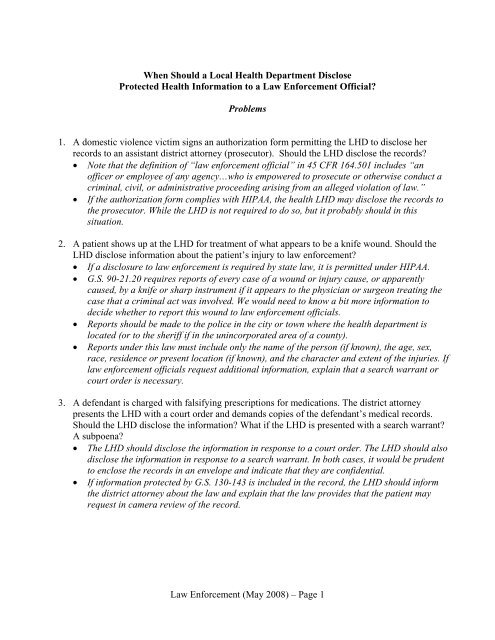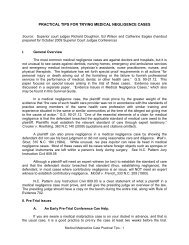Law Enforcement Disclosures: Case Studies and Answers
Law Enforcement Disclosures: Case Studies and Answers
Law Enforcement Disclosures: Case Studies and Answers
You also want an ePaper? Increase the reach of your titles
YUMPU automatically turns print PDFs into web optimized ePapers that Google loves.
When Should a Local Health Department Disclose<br />
Protected Health Information to a <strong>Law</strong> <strong>Enforcement</strong> Official?<br />
Problems<br />
1. A domestic violence victim signs an authorization form permitting the LHD to disclose her<br />
records to an assistant district attorney (prosecutor). Should the LHD disclose the records?<br />
• Note that the definition of “law enforcement official” in 45 CFR 164.501 includes “an<br />
officer or employee of any agency…who is empowered to prosecute or otherwise conduct a<br />
criminal, civil, or administrative proceeding arising from an alleged violation of law.”<br />
• If the authorization form complies with HIPAA, the health LHD may disclose the records to<br />
the prosecutor. While the LHD is not required to do so, but it probably should in this<br />
situation.<br />
2. A patient shows up at the LHD for treatment of what appears to be a knife wound. Should the<br />
LHD disclose information about the patient’s injury to law enforcement?<br />
• If a disclosure to law enforcement is required by state law, it is permitted under HIPAA.<br />
• G.S. 90-21.20 requires reports of every case of a wound or injury cause, or apparently<br />
caused, by a knife or sharp instrument if it appears to the physician or surgeon treating the<br />
case that a criminal act was involved. We would need to know a bit more information to<br />
decide whether to report this wound to law enforcement officials.<br />
• Reports should be made to the police in the city or town where the health department is<br />
located (or to the sheriff if in the unincorporated area of a county).<br />
• Reports under this law must include only the name of the person (if known), the age, sex,<br />
race, residence or present location (if known), <strong>and</strong> the character <strong>and</strong> extent of the injuries. If<br />
law enforcement officials request additional information, explain that a search warrant or<br />
court order is necessary.<br />
3. A defendant is charged with falsifying prescriptions for medications. The district attorney<br />
presents the LHD with a court order <strong>and</strong> dem<strong>and</strong>s copies of the defendant’s medical records.<br />
Should the LHD disclose the information? What if the LHD is presented with a search warrant?<br />
A subpoena?<br />
• The LHD should disclose the information in response to a court order. The LHD should also<br />
disclose the information in response to a search warrant. In both cases, it would be prudent<br />
to enclose the records in an envelope <strong>and</strong> indicate that they are confidential.<br />
• If information protected by G.S. 130-143 is included in the record, the LHD should inform<br />
the district attorney about the law <strong>and</strong> explain that the law provides that the patient may<br />
request in camera review of the record.<br />
<strong>Law</strong> <strong>Enforcement</strong> (May 2008) – Page 1
4. A law enforcement officer investigating a case of an ab<strong>and</strong>oned newborn asks the LHD for a list<br />
of all prenatal patients who delivered or were due to deliver within 2 weeks of a particular date.<br />
The officer does not have a search warrant or court order for the information. Should the LHD<br />
disclose the information?<br />
• No. The LHD should not disclose this information in the absence of a court order.<br />
5. A law enforcement officer is trying to locate a 15-year-old runaway. The officer provides the<br />
girl’s name <strong>and</strong> a picture, <strong>and</strong> asks LHD staff to notify police if they see the girl or know her<br />
whereabouts. The officer does not have a search warrant or court order for this information. The<br />
LHD has seen the girl, knows when her next appointment is, <strong>and</strong> has an address for her that may<br />
or may not be current. Should the LHD give information to the officer?<br />
• The LHD may provide some information to the law enforcement official in this situation.<br />
Under HIPAA, the LHD may disclose the girl’s name, address, date <strong>and</strong> place of birth, social<br />
security number, ABO blood type, rh factor, type of injury, date <strong>and</strong> time of treatment, date<br />
<strong>and</strong> time of death <strong>and</strong> a description of distinguishing physical characteristics.<br />
• This situation raises a few questions<br />
o May the LHD provide “date <strong>and</strong> time of treatment” information prospectively (future<br />
appointments)?<br />
o What if the “request” comes through the news media? For example, a news bulletin<br />
asking people to contact the Durham County Police Department if they have<br />
information about the girl?<br />
6. Joe <strong>and</strong> Sarah are waiting to be seen at the LHD clinic. They both check in <strong>and</strong> sign the patient<br />
log. Joe steals Sarah’s purse. May the LHD disclose Joe’s name <strong>and</strong> address to a law<br />
enforcement official?<br />
• Probably. HIPAA allows disclosure of information that constitutes evidence of a crime. One<br />
could argue that Joe’s name <strong>and</strong> address are not technically “evidence” but they are critical<br />
pieces of information law enforcement officials will need in order to investigate the crime.<br />
7. George tells a nurse at his physician’s office that he is going to “beat the ___ out of” his<br />
girlfriend for giving him syphilis. The nurse believes George’s threat. May she notify law<br />
enforcement?<br />
• Probably. HIPAA allows disclosures to law enforcement when the LHD believes that<br />
disclosure is necessary to prevent or lessen a serious <strong>and</strong> imminent threat.<br />
o There is some ambiguity in state law because G.S. 90-21.20B provides that<br />
disclosures to law enforcement officials are only allowed if authorized under 45<br />
C.F.R. 164.512(f) <strong>and</strong> the “serious <strong>and</strong> imminent” threat provision is in 45 C.F.R.<br />
164.512(j). On the other h<strong>and</strong>, G.S. 130A-12 allows health departments to make<br />
disclosures that are authorized by other law, including HIPAA. It is difficult to read<br />
these two state laws together <strong>and</strong> reach a clear legal conclusion.<br />
<strong>Law</strong> <strong>Enforcement</strong> (May 2008) – Page 2
8. A jail detention officer brings an inmate, Beth, to the health department for prenatal care. The<br />
health department wants Beth to take a medication while she is in custody. May the health<br />
department nurse give the medication to the detention officer?<br />
• Probably. HIPAA allows disclosures to a law enforcement official having lawful custody of<br />
an inmate if it is necessary for provision of care to the inmate.<br />
o There is some ambiguity in state law because G.S. 90-21.20B provides that<br />
disclosures to law enforcement officials are only allowed if authorized under 45<br />
C.F.R. 164.512(f) <strong>and</strong> the correctional/custodial provisions are in 45 C.F.R.<br />
164.512(k)(5).<br />
o Despite this ambiguity, it is important that the medication make it back to the health<br />
care personnel at the jail.<br />
o In this custodial situation, the officer is unlikely to allow the patient to keep the<br />
medication therefore the LHD could think a bit creatively. The LHD could, for<br />
example, put the medication in a bag with the patient’s name on it, h<strong>and</strong> it to the<br />
officer <strong>and</strong> ask the officer to deliver it to the health care personnel at the jail.<br />
<strong>Law</strong> <strong>Enforcement</strong> (May 2008) – Page 3
















